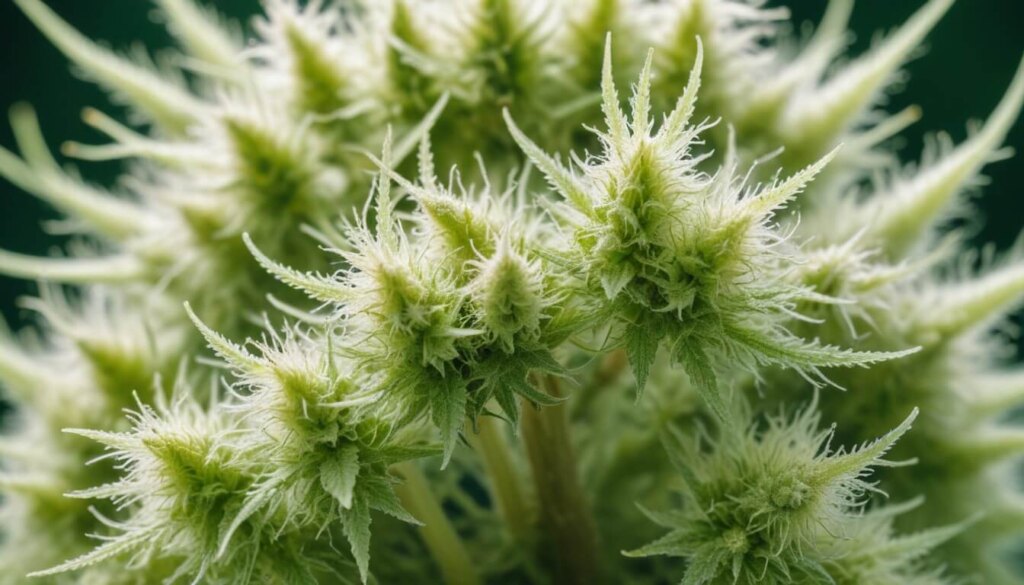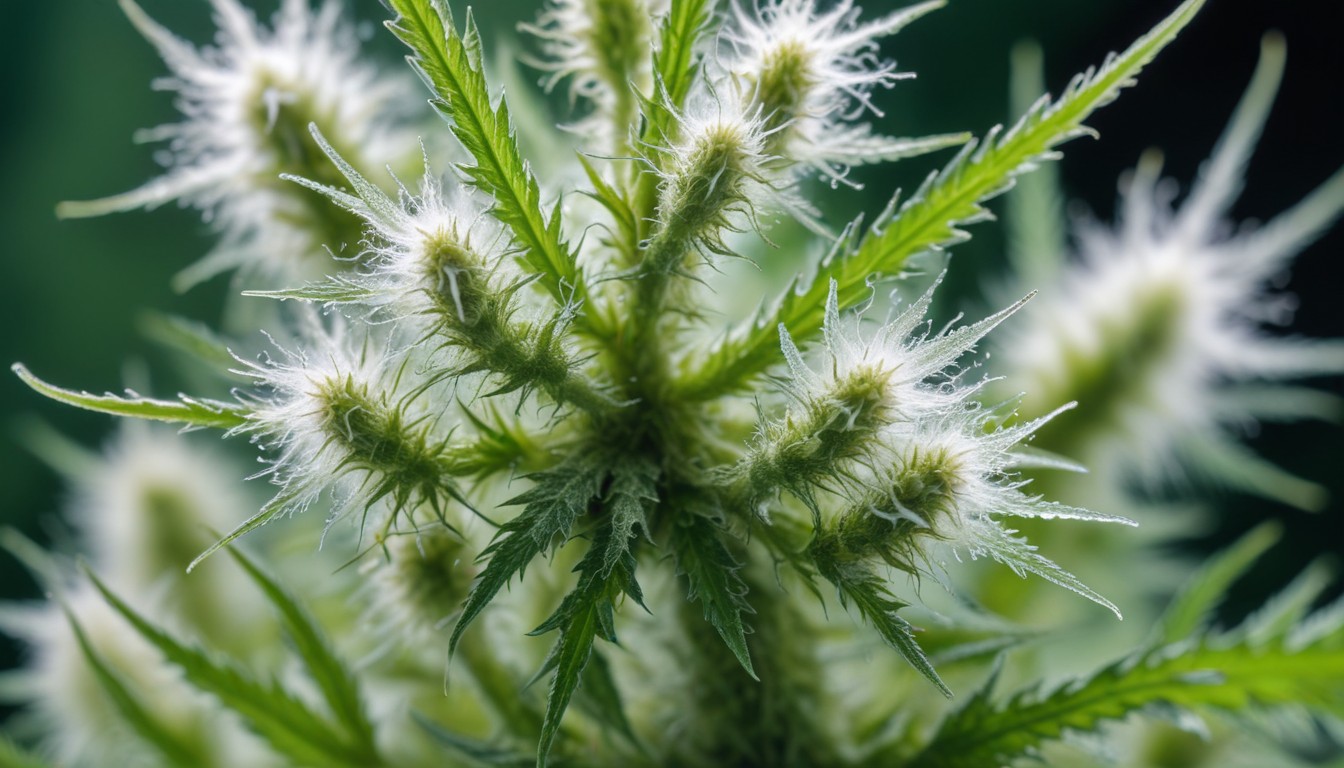Everyone must have heard the famous saying ‘Even the bravest soldiers need protection sometimes’. Turns out, this is the case with our cannabis plant too. It needs protection that is duly provided to it by a protective layer called ‘trichomes’ that develop on any part of the plant – leaves, flowers, stems. These Cannabis trichomes protect it from a wide range of external environmental threats.
What Exactly Are Trichomes?
Trichomes are very tiny glandular structures that can be found mainly on the flowers, leaves and stems of the cannabis plant, having a crystal appearance. They can either be used for multiple purposes or serve in just one aspect. In the first place, they work as a shield against the plant which is the first line of defense of the plant from various threats like pests, harmful ultraviolet rays, and environmental stressors.
For cannabis growers, trichomes are highly appreciated because they are the principal producers of cannabinoids, terpenes, and flavonoids, the main substances responsible for the cannabis’ characteristic smell and taste.
These compounds are the go-to molecules in determining the strength, smell, and taste of a particular strain of cannabis. When cannabis enthusiasts talk about the characteristics of a strain they are usually referring to how the trichomes glow and the complexity of the strain’s aroma.
Trichomes produce a great number of cannabinoids, which are the active compounds of cannabis, for example, THC and CBD. Such cannabinoids are behind the plant’s psychoactive properties as well as the many health benefits of the plant.
The Functions of Trichomes: More Than Just Resin Production
There are different types of cannabis trichomes found to exist in nature. These trichomes serve different functions and have different purposes, depending on their particular strain.
UV Light Protection
Trichomes are very important to prevent radiation effects on the plant by ultraviolet rays. The shiny and colorful coats of the glandular cells in leaves allow them to be able to avoid the ultraviolet rays which can lead to DNA damage of the plant material and thus degrade the overall health of the plant.
Pest Avoidance
Other than offering a food resource to insects in search of nectar, the existence of trichomes can also offer an early sign of insect predation. When the insect comes into contact with these sticky glands, the movement and agitation help activate a response from the plants which in turn, increases the amount of toxic chemicals that can be manufactured by the plants.
Moisture Retention
Bulbous trichomes, one of the three distinct trichomes present in cannabis plants, play an important role in keeping moisture near the plant’s surface under worse conditions, such as low air humidity or strong wind blow. As a result, this direction is vital to inhibit dehydration so that the plant can conduct photosynthesis and grow well without losing extreme water from the leaves.
The Different Types of Trichomes Explained
As mentioned earlier, different types of cannabis trichomes exist, so here is an overview of some of the most popular types that are found in nature:
Bulbous Trichomes
Trichomes, the smallest type, are of the bulbous kind, only measuring 10 micrometers across. This makes them almost unnoticeable to the human eye.
However, they are quite small and they live on the whole surface of the cannabis plant, which gives the flowers their shiny appearance and buds sticky nature.
They shield the plant from harmful UV rays, which might otherwise result in damage to the cell membranes and DNA. Moreover, These trichomes can also be used in detecting the presence of insects through contact. This contact with the insect leads to the trigger of the plant’s defense mechanisms.
Capitate-Sessile Trichomes
Capitate-sessile trichomes are almost identical to bulbous trichomes but are slightly larger and 75 micrometers in diameter. They can be observed under the microscope.
The caps of these mushrooms are more plentiful than their bulbous counterparts and typically resemble the cap of a mushroom. Capitate-sessile trichomes with hairs are mainly on the lower surface of leaves and buds.
Their chemical profile is unique as capitate-sessile trichomes produce large amounts of cannabinoid derivatives, which are highly prized by extractors.
Capitate-Stalked Trichomes
This is the largest and most noticeable trichome type which is identified by the mushroom-like structure with a base that rises upwards away from the plant surface.
Capitate-stalked trichomes tend to reach their highest number during the flowering stage of the cannabis plant and mainly on the surface of the flower.
The Lifecycle of Trichomes: A Sign of Harvest Time

The life cycle of cannabis trichomes is an important aspect that cannabis growers and harvesters must know about before coming into this business. These trichomes pass through several stages, as the marijuana growth stages pass, only to reach their final harvesting stage.
Clear Trichomes
During this phase, flushing is usually done which is not ripe and its trichomes have not yet developed their full potency, thus leaving an inferior product.
Cloudy Trichomes
Trichomes ripen when they get a white cloudy or milky appearance. The peak time of cannabinoid synthesis, including the THC, the main psychotropic component of marijuana, is achieved during this stage. The collection of the resinous trichomes which are mostly cloudy means that the plant has reached its maximum potential for cannabinoid content.
Amber Trichomes
At this point, the resin glands start to turn yellowish or golden which is an indicator that THC is becoming less potent as it breaks down. Indica strains are usually picked up during the late flowering stage for their sedative and body-focused effects.
Mixed Trichomes
Usually, a 50/50 split of cloudy and amber trichomes leads to a strain that offers a balance between mental and physical simulations, this is a perfect blend of uplifting and relaxing effects.
Trichomes and Cannabis Quality: A Potent Relationship
The visual look of trichomes is a very efficient manner to determine the maturity and quality of the cannabis when it is ready to be harvested. Here’s how trichome characteristics relate to cannabis quality:
Clarity and Color
The plant is still immature, as the visible trichomes are generally clear. One of the easiest signs to look for is the color of the trichomes, that is, the cloudy or milky white hairs.
This is a good indicator of the peak THC levels and is often associated with high-quality, potent cannabis.
Amber trichomes are an indicator of high CBN concentration, a cannabinoid that forms when THC degrades and usually has a calming effect on the user.
Density:
Trichomes being in high concentration indicates that a plant is properly handled, and thus, will produce more cannabinoids and terpenes resulting in higher potency and better quality.
Integrity
Crushing and manipulation will potentially degrade trichomes, causing loss of cannabinoids and terpenes. High-grade cannabis is filled with care and has correct preservation to keep the shape of trichomes that are to be intact.
Preserving Trichomes: Handling and Processing Cannabis
Whether you are operating within the cannabis industry or are someone interested in its products, an elementary knowledge of trichomes and their role is a must to help you understand and fully realize the benefits of cannabis.
Cannabis trichomes not only protect the cannabis plant from potential harm around the world, they are unique among hundreds of known medically and therapeutically useful trichome compounds unique to this amazing plant. It truly deserves applause for its important role in providing quality production facilities.
Experienced cannabis farmers are accustomed to growing cannabis to preserve trichomes. With proper care and dedication, trichome cultivation will continue to be the future of unlocking the hidden potential of this world, which is undoubtedly going to benefit everyone in the long run.
It is evident that these trichomes play an important role in guarding the efficacy and potency of cannabinoids and will continue to do so if they are kept in their optimal settings.





